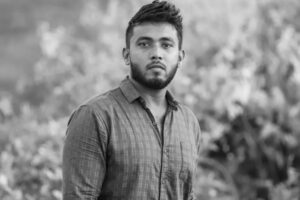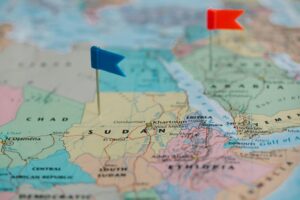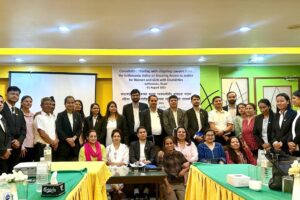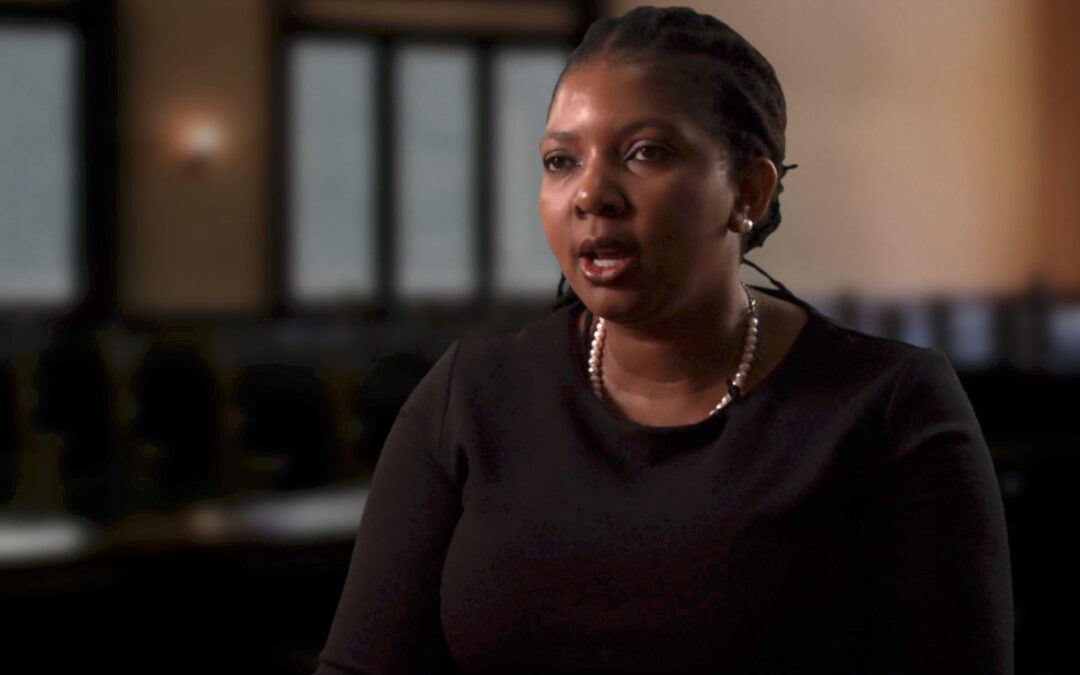
Dec 18, 2017 | Multimedia items, News, Video clips
Raquel Yrigoyen Fajardo, Karabo Ozah and Charles Dinda talk about traditional justice systems in video interviews recorded at the 2017 ICJ Geneva Forum.
Dr. Raquel Yrigoyen Fajardo, Lawyer and Professor at the Law Faculty of the Pontifical Catholic University of Peru, and founding member of the International Institute on Law and Society (IIDS), describes the survival and contemporary recognition of justice systems of indigenous peoples in the Americas, despite the history of colonial domination.
She argues that indigenous justice systems often already reflect many international human rights standards, and where there may be discrepancies change should be sought through respectful engagement and consultation rather than coercive imposition.
In contrast, Ms Karabo Ozah, Deputy Director of the Centre for Child Law at the University of Pretoria in South Africa, argues that it is crucially important to ensure that customary and traditional courts respect domestic legislation and international standards on human rights.
Otherwise she warns, based on her experience, customary courts too frequently fail to protect the rights of marginalized groups, children, LGBTI, and women.
Charles Dinda, Senior Legal Adviser with the Danish Institute for Human Rights in Zambia, points out that while traditional and customary justice institutions are the most easily accessible and in many respects most credible institutions for some populations, their decisions are too often inconsistent or unfair.
To avoid this, he insists on the importance of understanding and studying the way these systems operate and on the need to engage with them to learn about their practices and to build their capacities so that they have better knowledge of international human rights standards and indeed of the national laws in the countries where they operate.
Watch the interview with Dr. Raquel Yrigoyen Fajardo
Watch the interview with Karabo Ozah
Watch the interview with Charles Dinda
NOTE:
The views expressed by the participants do not necessarily reflect those of the ICJ.
For more information about the 2017 Geneva Forum on Customary and Traditional Justice Systems, click here or contact matt.pollard(a)icj.org .
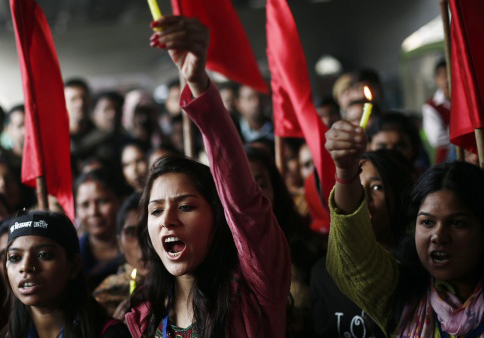
Nov 25, 2017 | Multimedia items, News, Video clips
Over the last year, since 25 November 2016, the ICJ has published a series of (video) profiles introducing the remarkable work of ICJ women Commissioners and Honorary Members.
“The ICJ has a strong focus on the struggle to eliminate violence against women. It is supporting the judiciary, independent civil society organizations and women’s rights defenders, in their work to promote international standards, ensure that victims are made visible and that States understand their responsibilities and obligations. At the same time, the ICJ provides much-needed judicial education on gender-based violence,” said Justice Radmila Dragicevic-Dicic, ICJ Commissioner, member of ICJ’s Executive Committee, and Justice of the Supreme Court of Serbia, on the occasion of 25 November, International Day for the Elimination of Violence against Women.
ICJ Commissioners have been at the forefront of the work to reform justice systems to make it easier for women to take cases of domestic violence to the courts, to punish perpetrators of rape and sexual assault as a war crime, to challenge discriminatory religious and family laws and to support victims of human trafficking and forced prostitution.
The ICJ has also supported judicial training programmes on access to justice for women. In 2016, the ICJ, in collaboration with UN Women, hosted a workshop for representatives from the judiciaries of Indonesia, Philippines, Timor Leste, and Thailand.
The participants of the workshop developed and adopted the Bangkok General Guidance for Judges in Applying a Gender Perspective.
In follow up, for example, the Supreme Court of Indonesia has now issued a Regulation based on the General Guidance, requiring judges to apply a gender perspective as they consider cases before them that involve women’s human rights.
Working in partnership with other organizations and the UN, the ICJ and its Commissioners will continue to work to ensure justice for women and to end gender-based violence.
The video interviews of ICJ women Commissioners and Honorary Members can be accessed here:
Justice Radmila Dragicevic-Dicic has worked on issues of organized crime and human trafficking. In the Serbian Constitution, human trafficking is now categorized as a crime against humanity and is taken very seriously. Radmila highlights the importance of ensuring the non-punishment, safety and protection of victims as well as their right to access compensation.
Prof Jenny Goldschmidt is a former President of the Equal Treatment Commission of the Netherlands and has combined academic research with practical work, with a particular focus on non-discrimination and the concepts of equality. She considers it is vital to take cases to the Treaty Bodies and courts everywhere to establish severe measures against discrimination and domestic violence.
Asma Jahangir is an Honorary Member of the ICJ, and the co-founder of Pakistan’s first all female law firm. She worked on a number of landmark cases including on issues such as whether women could get married without their father’s permission, be entitled to family maintenance or whether women should be judged according to religious law.
Imrana Jalal is a human rights lawyer and gender specialist in the Asian Development Bank in Manila. Imrana helped draft and negotiate the passage of the ground-breaking Fiji Family Law Act, which took twelve years to pass. She considers that in the area of family law, some progress has been made but it is hard because it is based on the premise that women have an equal right to property and this directly confronts social norms.
Hina Jilani is an advocate of the Supreme Court of Pakistan and served as the first UN Special Representative on Human Rights Defenders. She considers domestic violence in Pakistan as a major problem. Although the Pakistani judiciary is traditionally very conservative, Ms Jilani considers there has been progress because women’s rights advocates present cases in such a way as to make the social inequalities and injustices apparent.
Justice Sanji Monageng is a member of the International Criminal Court. She considers that the ICC has not done very well in prosecuting sexual and gender-based violence so far. The new Chief Prosecutor, Fatou Bensouda, has created a policy on sexual violence and gender issues, establishing a dedicated unit. She says is it evident in the cases that now come before her, there is a lot more attention being paid to sexual violence.
Karinna Moskalenko is a Russian lawyer and a founder of the International Protection Centre in the 1990s after Russia had ratified the Optional Protocol to the ICCPR. She explains her work to support women who are much more vulnerable than men, particularly because of the problem of domestic violence.
The former ICJ Vice-President Michèle Rivet was the first President of the Quebec Human Rights Tribunal from 1990 and until 2010. For Michèle, those who work in the field of human rights form a global village and have a duty to help women victims of violence: “we must all walk together on the long march to equality.”
Prof. Leila Zerrougui is Algerian and has served at the Algerian Supreme Court. She worked in the DRC as part of the UN Stabilization Mission and was Special Representative of the Secretary General for Children and Armed Conflict. In the DRC, she established mobile criminal justice system, with an investigator, prosecutor and a mobile court and prison in every Province. In this context, she explained how rewarding it was to see a colonel taken to the village where he and his soldiers had raped women to face justice there.
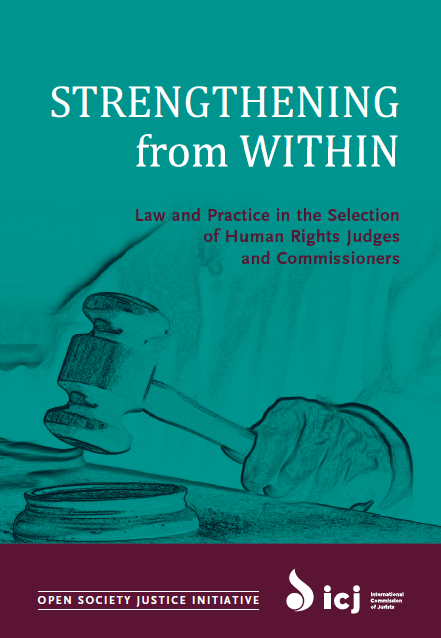
Nov 16, 2017 | Artículos, Informes, Noticias, Publicaciones
Los procedimientos nacionales para la selección de los jueces de los tribunales regionales de derechos humanos frecuentemente no cumplen con los estándares de imparcialidad, inclusión y transparencia, concluye un informe conjunto de OSJI y de la CIJ publicado hoy.
Universal-Fortaleciendo desde Dentro-Publications-Reports-2017-SPA (el informe en español, PDF)
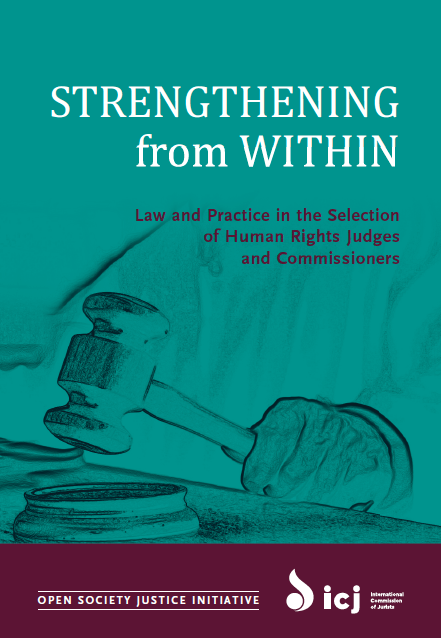
Nov 16, 2017 | Articles, Nouvelles, Publications, Rapports
Les procédures nationales de sélection pour les magistrats des cours régionales des droits de l’Homme ne respectent que trop rarement les standards d’équité, d’intégration et de transparence, selon les conclusions d’un rapport publié aujourd’hui par la CIJ et l’Open Society Justice Initiative.
Ce rapport fait des recommandations visant à assurer la sélection des meilleurs candidats comme magistrats des cours régionales des droits de l’Homme.
Les cours et commissions régionales des droits de l’Homme, y compris la Cour africaine des droits de l’Homme et des peuples, la Cour européenne des droits de l’Homme et la Commission interaméricaine des droits de l’Homme, sont des défenseurs essentiels de l’état de droit.
Pourtant, malgré leur importance, le processus de sélection des magistrats et commissaires qui siègent dans ces organes, c’est-à-dire la façon dont ils sont nominés, contrôlés et in fine sélectionnés, demeure largement inconnu et bien souvent organisé de manière opaque.
Associée à des efforts politiques répétés pour éroder les institutions de droits internationaux, cette opacité souligne le besoin crucial de se concentrer sur le renforcement de ces systèmes depuis l’intérieur.
Ce rapport, consolidé depuis l’intérieur, répond justement à ce défi.
Il met en lumière les processus qu’utilisent les Etats pour nominer et sélectionner les magistrats et commissaires des droits de l’Homme.
En analysant les pratiques de nominations de 22 pays, ce rapport documente la façon dont les procédures de nominations ne respectent pas assez souvent les cadres légaux et les standards internationaux qui seraient censés les guider.
Ce rapport identifie également les pratiques prometteuses et propose des recommandations fondées sur l’expérience.
Un pouvoir judiciaire indépendant est essentiel à l’état de droit: pour les cours nationales, les procédures de sélection du pouvoir judiciaire doivent être équitables, transparentes et basées sur le mérite.
Ainsi que que le fait remarquer ce rapport, les cours et tribunaux internationaux du monde entier sont à la même enseigne.
Universal-Strengthening from Within-Publications-Reports-2017-FRA (rapport complet en français, PDF)
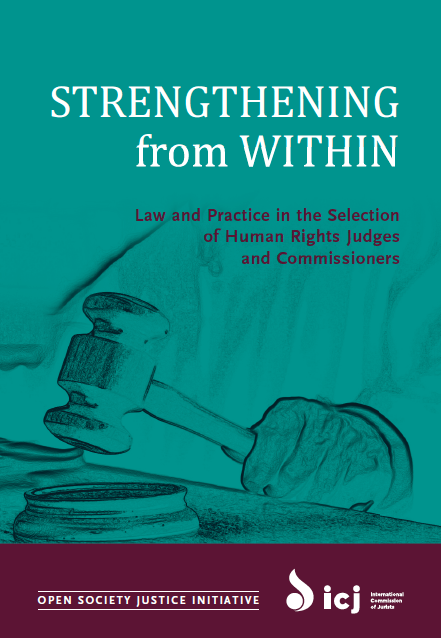
Nov 2, 2017
National procedures for the selection of regional human rights court judges too often fail to meet standards of fairness, inclusiveness and transparency, a joint Open Society Justice Initiative (OSJI) and ICJ report published today concludes.
The report makes recommendations aimed at ensuring that the best qualified candidates are selected as judges of regional human rights courts.
Regional human rights courts and commissions—including the African Court of Human and Peoples’ Rights, the European Court of Human Rights, and the Inter-American Court of Human Rights—are essential safeguards for the rule of law.
Yet despite their importance, the process of selecting the judges and commissioners who sit on these bodies—how they are nominated, vetted, and ultimately selected—remains largely unknown and often shrouded in secrecy.
Coupled with broader political efforts to erode international judicial institutions, this secrecy underscores the pressing need to focus on strengthening these systems from within.
This report, Strengthening from Within, responds to that challenge.
It shines a light on the processes that states use to nominate and select human rights judges and commissioners.
By analyzing the nomination practices of 22 countries, the report documents the ways in which nomination procedures often fall short of the legal frameworks and international standards that should guide them.
It also identifies promising practices and offers recommendations for improvement grounded in experience.
An independent judiciary is essential to the rule of law: for national courts, procedures for judicial selection must be fair, transparent, and merit-based. As this report makes clear, the world’s international courts and tribunals are no different.
Universal-Strengthening from Within-Publications-Reports-2017-ENG (Full report in English, pdf)






